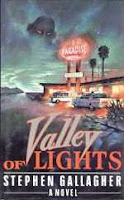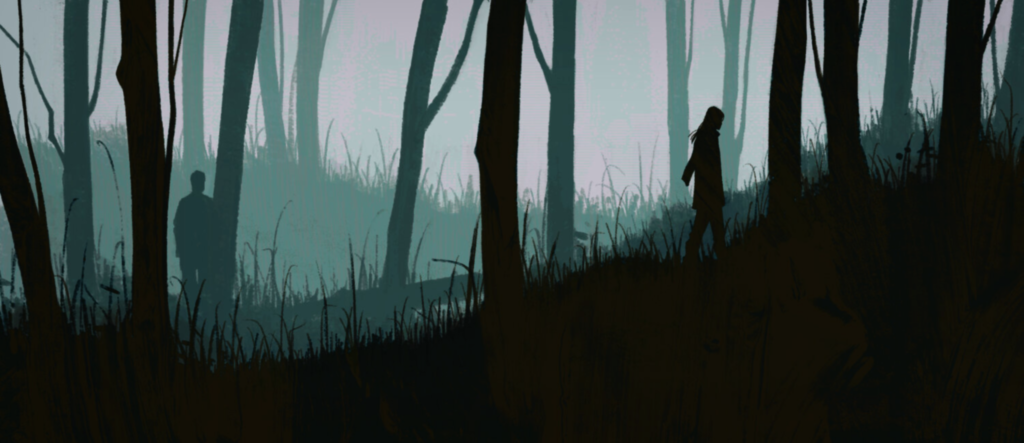 Once again, a question in the comments spawns a post… Stan, people are gonna start talking.
Once again, a question in the comments spawns a post… Stan, people are gonna start talking.
The true answer to the question (about which of my novels I’d most like to see adapted) is The Spirit Box, for reasons I’ll go into another time, but for now here’s an extract from my afterword to the Telos Classics edition of Valley of Lights, preceded by a spot of scene-setting:
A routine call to a sleazy Phoenix hotel throws police sergeant Alex Volchak into a world where the brain-dead check themselves out of hospital, and a stranger can seem to know the most intimate details of his life. Like his feelings for Loretta, the neighbour who’s more than a friend, and her daughter Georgina, so much the child he never had. Volchak finds himself on the hunt for a child killer, someone who can apparently switch bodies with ease, and who is playing games with the police. And then Georgina is taken.
Although I was a Granada employee for five years, I never freelanced for the company until the commissioning of Dark Matter (as Eleventh Hour was initially called). They took an interest in my writing while I was there, though. I worked in the Presentation Department as an Assistant Transmission Controller, which basically meant I did the hands-on cut/wipe/fade business involved in getting all the day’s scheduled material onto the air. There was some office prep involved but most of our time was spent in a windowless control room in the bowels of the Quay Street building, where we lived like moles.
Every now and again I’d get a call inviting me to a meeting… not a pitch meeting, just a get-to-know to find out what this bloke in the cellar was up to. One such call was from Gerry Hagan, head of the Script Department. As a result of it he put me in touch with Stuart Orme, a TV director on the lookout for film projects. There was no real Granada angle to this; it was just the kind of thing that Gerry was known for.
Stuart has since gained a profile as a director of high-end British TV (he directed The Sculptress and the recent adaptation of The Lost World) but back then he was making a mark in the newly-burgeoning music video business and looking for a feature. Our first attempt at getting one off the ground was an adaptation of my second novel, Follower, the story of a man stalked by a shape-changer from Norse mythology with a choice of setting not a little influenced by Gavin Lyall’s Blame the Dead. We got that one half-financed, but the project foundered for lack of British investment to match the Norwegian oil money we found.
I showed Valley of Lights to Stuart while it was still in manuscript. He brought in his MTV producing partners and together they optioned the material. The company was named AWGO, comprising the initials of the principals (along with Stuart there were Marcello Anciano and Martin Wyn Griffith). They had offices on Beak Street on the fringes of Soho, just around the corner from Curtis Brown where Leah Schmidt, the media half of my wizard new representation team, was busily remaking my screenwriting career.
My main memory of the AWGO building is of a shared stairway that was like something out of Graham Greene; ill-lit, peeling, decorously decaying… but then, almost every film company I’ve ever had dealings with has been approached by a stairway exactly like it. The uncollected mail on the stairs. The mysterious co-tenants who never appear.
 I suppose the appeal of the material would have been obvious, in retrospect. It was a natural low-budget genre piece that hit all the commercial buttons and was eminently makeable, had a fantastical premise that called for no elaborate or expensive effects, and it offered a bunch of eager Brits like us an ‘in’ to the American filmmaking scene. I wrote the screenplay, and they sent it out. First to the big studios and then to some of the larger independents like New Line, Handmade, Cannon, The Samuel Goldwyn Company. Wherever it went, the script seemed to make a mark. By 1986 AWGO were encouraged enough to take me out to Los Angeles, from where we struck out further on a tour of Arizona locations that I documented in the diary that forms a part of this book.
I suppose the appeal of the material would have been obvious, in retrospect. It was a natural low-budget genre piece that hit all the commercial buttons and was eminently makeable, had a fantastical premise that called for no elaborate or expensive effects, and it offered a bunch of eager Brits like us an ‘in’ to the American filmmaking scene. I wrote the screenplay, and they sent it out. First to the big studios and then to some of the larger independents like New Line, Handmade, Cannon, The Samuel Goldwyn Company. Wherever it went, the script seemed to make a mark. By 1986 AWGO were encouraged enough to take me out to Los Angeles, from where we struck out further on a tour of Arizona locations that I documented in the diary that forms a part of this book.
It was a magical collection of moments but, in the end, the movie fell through. We’d got so close, in fact, that AWGO had begun hiring production people and was able to raise the money from Zenith to go beyond a yearly option and buy the novel’s film rights outright. So I did pretty well out of it, the downside being that those rights will never revert to me – they’re Zenith’s property now, and always will be.
But those who’d shown most interest eventually said pass, and some of them went off and developed similar properties of their own. Will the chances of our seeing a Valley of Lights movie ever be revived? I kind of doubt it, and for one reason only, which is that it no longer has the fresh currency that it would have had were we to have made it back then. The pursuit of a body-hopping entity in a crime/horror fusion was to become a staple in films of the late ’80s and ’90s, and I fear we’ve seen enough of them. The trend began with New Line’s 1987 The Hidden, in which Kyle Mclachlan’s Lloyd Gallagher chases down a disembodied alien whose targets for occupation along the way include a police lieutenant.
People told me to sue. But who’s to say it wasn’t coincidence? And in truth, I rather enjoyed The Hidden and had little heart for kicking up a fuss about it. Since then there’s been Fallen, Wes Craven’s Shocker, even a body-hopping plotline in Twin Peaks…
There are times when you just need to lay down your cards and move on to the next hand.

5 responses to “Valley of Lights”
Sorry for the barrage of questions but thanks for taking the time to post up something about ‘Valley Of Lights’ – it must be frustrating when you get close to seeing something made and then it drops through (although knowing the nature of film and TV, you probably expect it by now). Funny that you mention being a old Granada employee: I’m a current one (the International arm, anyway) working out of London restoring and remastering films from, amongst others, the Rank and ITC libraries. I also sit in dark rooms with most people wondering what it is I do all day!
I see the Granada logo in the most unexpected places these days. Seems that the company has sucked in almost all of the UK’s back catalogue of film and TV!
I remember there being much excitement around the forums a year or two back at the prospect of early Callan material being restored and reissued, following a deal between Granada and Network Video.
I don’t suppose..?
“Callan”? *Ears prick up*
Network have licenced a huge amount of programming – both film and TV – from Granada, some of which we don’t deal with (e.g. TV shows like ‘Man About The House’ or ‘On The Buses’), but much that we do (the ATV catalogue programmes like ‘Thriller’ and the feature film libraries). Network have their detractors but I think they do a very good job getting rarely seen shows out on DVD (and they always do their best with regard to extra material). ‘Callan’ isn’t a Granada title although I believe Network have purchased the rights to the series – not all the early episodes still exist though.
I thought Network did a superb job with STRANGE REPORT, one of the last (the last?) of those 35mm ITC shows… and I was fascinated to see, in retrospect, how it straddled the gap between ’60s formula and the new ’70s sensibility.
There’s a bloke on eBay who regularly offers bootlegs of the surviving CALLAN episodes but frankly, and ethics apart, I’d rather wait.